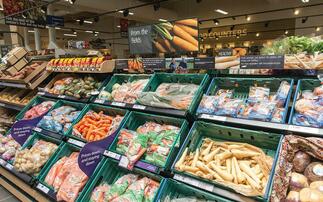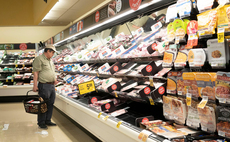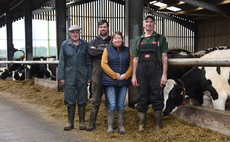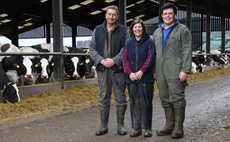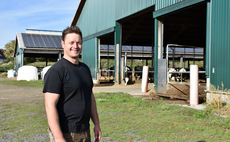
Having set up Love British Food in 2002 founder Alexia Robinson has been working tirelessly to put British food and farming on the map, and more so, get into public procurement.
Hospitals, schools and universities are high on the priority list, and on March 20, for the first time ever, public sector leaders, farmers and industry professionals came together at Hammonds End Farm, run by former NFU deputy vice president Stuart Roberts.
The aim was to discuss the supply chain and food security, along with ideas on how to get more British food, produced by sustainably by UK farmers, onto menus across the country.
Key points from the report of the day included:
- To increase farmer understanding of the public sector as a customer and to encourage more farmers to view the public sector as a viable partner
- A commitment to encourage and maintain progress where it has been made
- Strengthen commitments to buy British in the new Government Buying Standards
- Promote a higher level of understanding of the potential opportunities provided by the Crown Commercial Service buying system, the UK's largest public procurement organisation
- Encourage food service providers to include a ‘Buy British' category in product listings
Stuart focused on the rounded approach of British farmers - British farmers are, he said, leading the way in the production of healthy food, coupled with additional benefits such as nature habitat, flood mitigation, water quality, and carbon sequestration.
READ NOW: Whole milk making a comeback - is the tide turning on alternative milks?
Healthcare
The session then moved on to how British food and farmers can play a pivotal role in supply chains to the NHS.
According to the NHS National Standard for Healthcare Food and Drink in November 2022, ‘every healthcare organisation has a responsibility to provide the highest level of care possible for their patients, staff and visitors. This includes the quality, nutritional value and the sustainable aspects of the food and drink that is served, as well as the overall experience and environment in which it is eaten. It is important that all healthcare organisations see the intrinsic value in the view of ‘food as medicine' and that it remains a standing item on the board agenda. Senior NHS leaders must be held accountable for the standard and quality of food served in their organisation, and patient and staff nutrition must be prioritised.'
The idea is that sustainably produced food provides a higher nutritional value, and the outcome is better patient health. A healthier society should also mean less stress on hospitals.
BAPEN statistics show that 40 per cent of patients admitted to hospital are at risk of malnutrition. According to NHS data, more than 800,000 patients were admitted to hospital with malnutrition and nutritional deficiencies in 2022, a three-fold increase from 2012.
Dr Hannah Fraser, a Nuffield Farming Scholar researching farming systems and the nutritional density of food spoke about the growing ability to measure micro nutritional content of fresh produce. The way we farm can impact nutritional content, and there could be a market for produce that is grown specifically for enhanced nutritional density. She highlighted numerous examples such as Pasture for Life beef with good fats, Omega 3's, and low bad fats, Omega 6. In France and Finland farmers are applying selenium containing foliar plant feeds to deliver selenium enriched flour.
Tim Radcliffe, net zero food program manager, NHS England and a director of Love British Food revealed how important the story behind the food is.
READ NOW: NHS nurse finds solace in farming after working through pandemic
He said knowing where food comes from was important to patients - locally sourced Forest of Bowland venison from the Ribble Valley in Lancashire in the East Lancashire Hospital Trust became one of the most chosen items on the days they were available, accounting for 33-50 per cent of patient meal choices.
Carbon footprint is also an NHS focus, and by April 2028 every product needs to be carbon footprinted.
Education and food
There will hopefully be moves made to make sure British food is on more school menus and offered in college and university settings.
Dairy farmer and former NFU Dairy Board Chair Michael Oakes said ‘it is not easy for schools to work directly with local milk supply. There are barriers to overcome but also some solutions emerging.'
Free school milk payment comes from the local authority, but if schools want to continue the choice of milk beyond this, he highlighted that organising a payment system between parents and the milk supplier is somewhat difficult.
There are schemes out there that are helpful, one being The Soil Association's ‘Food for Life' award scheme which helps to focus schools on food and nutrition education and school meals.
University's can be a different beast as students look to source food that is nature-friendly and sustainable.
Director of student experience and education at the University of Reading Matt White spoke about Reading's ‘Menu of Change' – it is one of the first universities in the UK to commit to the idea which includes buying fresh and seasonal produce, and focuses on whole, minimally processed foods and better agricultural practices.
Securing contracts
Working together with key stakeholders and figures, Love British Food founder is positive that with the right support and information, her goal of getting more British food in public sector areas can be done.
"In Britain we produce fantastic food. At our landmark meeting with public sector influencers, we gathered invaluable insights that have framed our report," said Alexia.
"Encouraging a Buy British policy within the public sector is not only more sustainable, helping them to meet their targets on net zero, sustainability and social value, but it will also give more people access to high quality, locally sourced British food.
"We look forward to continuing to lead engagement within the public sector, with the final ambition of a principle for buyers to look carefully at their supply chains and to make British farmers the first food supplier of choice throughout the entire public sector.
"We will continue to work with decision makers in the public sector to make the ambitions within this report a reality."














